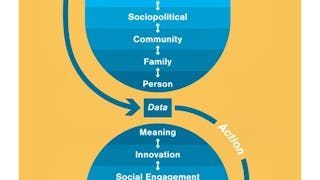This third of five courses explores topics related to the social determinants of health and health care systems. This course will also focus on the relationship between the social determinants of health, mental health, substance abuse, and trauma. The topics of this course include:


Social Determinants of Health: Health Care Systems
Ce cours fait partie de Spécialisation Social Determinants of Health: Data to Action


Instructeurs : Daniel J. Pesut, Ph.D., RN, FAAN
Inclus avec
Compétences que vous acquerrez
- Catégorie : Mental Health
- Catégorie : Community Mental Health Services
- Catégorie : Data Visualization
- Catégorie : Health Systems
- Catégorie : Health Disparities
- Catégorie : Correlation Analysis
- Catégorie : Health Informatics
- Catégorie : Health Equity
- Catégorie : Data Ethics
- Catégorie : Substance Abuse
- Catégorie : Health Policy
- Catégorie : Healthcare Ethics
- Catégorie : Public Health
- Catégorie : Data Analysis
- Catégorie : Trauma Care
- Catégorie : Heat Maps
- Catégorie : Social Determinants Of Health
Détails à connaître

Ajouter à votre profil LinkedIn
Découvrez comment les employés des entreprises prestigieuses maîtrisent des compétences recherchées

Élaborez votre expertise du sujet
- Apprenez de nouveaux concepts auprès d'experts du secteur
- Acquérez une compréhension de base d'un sujet ou d'un outil
- Développez des compétences professionnelles avec des projets pratiques
- Obtenez un certificat professionnel partageable

Il y a 5 modules dans ce cours
This module will introduce the concept of health literacy, as we also examine how health literacy is measured. In lesson one, we will look at some of the social determinants of health that interact with health literacy, as we investigate the link between low health literacy and poor health outcomes. We will also review the Health Literacy Umbrella as a framework for improving health literacy, as we evaluate several policies, solutions, and perspectives for addressing disparities in health literacy. In lesson two, we will explore some of the resources available for measuring health literacy as we consider the many perspectives of health literacy measurement.
Inclus
3 vidéos5 lectures2 devoirs1 sujet de discussion5 plugins
In this module, we will examine the impact of the social determinants of health on mental health and substance abuse. In lesson one, we will define mental health, as we look at the global prevalence and global burden of mental health disorders. This lesson will also focus on the global prevalence and global burden of substance abuse disorders, as we investigate influencing factors of drug use. Lesson two will introduce the life course approach to mental health, as we discuss both risk factors and protective factors that impact mental health. We will also consider how the social determinants of health contribute to mental health outcomes. Finally in lesson three, we will evaluate global, national, and regional policies and interventions for improving mental health outcomes.
Inclus
4 vidéos10 lectures2 devoirs1 sujet de discussion3 plugins
In this module, we will look at the relationship between violence, conflict and trauma and the social determinants of health. In lesson one, we will define the different types of trauma, as we look at the global prevalence of violent and traumatic events. We will also focus on the effects of trauma and violence in vulnerable populations. Lesson two will explore Adverse Childhood Experiences in the context of social determinants of health. The impact of trauma on vulnerable countries and communities will also be examined. In lesson three, we will evaluate community resources, policies and interventions for addressing violence, conflict, and trauma in communities. We will also look at examples of effective interventions as we consider how to improve the social determinants of health and reduce trauma experiences.
Inclus
3 vidéos9 lectures2 devoirs1 sujet de discussion1 plugin
This module will focus on the ethical considerations of addressing social determinants of health in health systems, and the ethical considerations of using SDOH-related data. In lesson one, we will explore the “Spheres of Influence'' framework in order to understand the ethical principles that guide how clinicians, health care organizations and communities should address SDOH. We will also examine the Public Health Code of Ethics, as we review the concept of health justice and health equity. In lesson two, we will evaluate the ethical considerations related to the use of SDOH data. We will also explore the five guiding principles proposed by the Executives for Health Innovation as part of the ethical framework for SDOH data. Finally, we will assess how the ethical frameworks discussed in this course can be applied to our course data sets, as we consider how our findings might be employed in a health system or to guide action to improve health.
Inclus
2 vidéos4 lectures2 devoirs1 sujet de discussion4 plugins
This module will focus on analyzing, displaying and interpreting social determinants of health data, with a particular focus on identifying correlations between social determinants of health. Lesson one will provide an overview of correlation analysis and heat map visualization. In lesson two, we will learn how to calculate the Pearson correlation coefficient and create heatmaps in R. Using the NHANES dataset, we will look at the correlation between income, education, marital status, family savings, depression, insurance, household size, drinks per day, smoker, and body mass index. Using the Omaha System dataset, we will look at the correlation between the social determinants of health signs & symptoms. Finally, we will discuss how to interpret the results of our analysis as we visualize our findings using heatmaps.
Inclus
2 vidéos4 lectures1 évaluation par les pairs1 sujet de discussion1 laboratoire non noté4 plugins
Obtenez un certificat professionnel
Ajoutez ce titre à votre profil LinkedIn, à votre curriculum vitae ou à votre CV. Partagez-le sur les médias sociaux et dans votre évaluation des performances.
Instructeurs


Offert par
En savoir plus sur Health Informatics
 Statut : Essai gratuit
Statut : Essai gratuitUniversity of Minnesota
 Statut : Essai gratuit
Statut : Essai gratuitUniversity of Michigan
 Statut : Essai gratuit
Statut : Essai gratuitUniversity of Minnesota
 Statut : Essai gratuit
Statut : Essai gratuitUniversity of Minnesota
Pour quelles raisons les étudiants sur Coursera nous choisissent-ils pour leur carrière ?





Ouvrez de nouvelles portes avec Coursera Plus
Accès illimité à 10,000+ cours de niveau international, projets pratiques et programmes de certification prêts à l'emploi - tous inclus dans votre abonnement.
Faites progresser votre carrière avec un diplôme en ligne
Obtenez un diplôme auprès d’universités de renommée mondiale - 100 % en ligne
Rejoignez plus de 3 400 entreprises mondiales qui ont choisi Coursera pour les affaires
Améliorez les compétences de vos employés pour exceller dans l’économie numérique
Foire Aux Questions
To access the course materials, assignments and to earn a Certificate, you will need to purchase the Certificate experience when you enroll in a course. You can try a Free Trial instead, or apply for Financial Aid. The course may offer 'Full Course, No Certificate' instead. This option lets you see all course materials, submit required assessments, and get a final grade. This also means that you will not be able to purchase a Certificate experience.
When you enroll in the course, you get access to all of the courses in the Specialization, and you earn a certificate when you complete the work. Your electronic Certificate will be added to your Accomplishments page - from there, you can print your Certificate or add it to your LinkedIn profile.
Yes. In select learning programs, you can apply for financial aid or a scholarship if you can’t afford the enrollment fee. If fin aid or scholarship is available for your learning program selection, you’ll find a link to apply on the description page.
Plus de questions
Aide financière disponible,
¹ Certains travaux de ce cours sont notés par l'IA. Pour ces travaux, vos Données internes seront utilisées conformément à Notification de confidentialité de Coursera.

